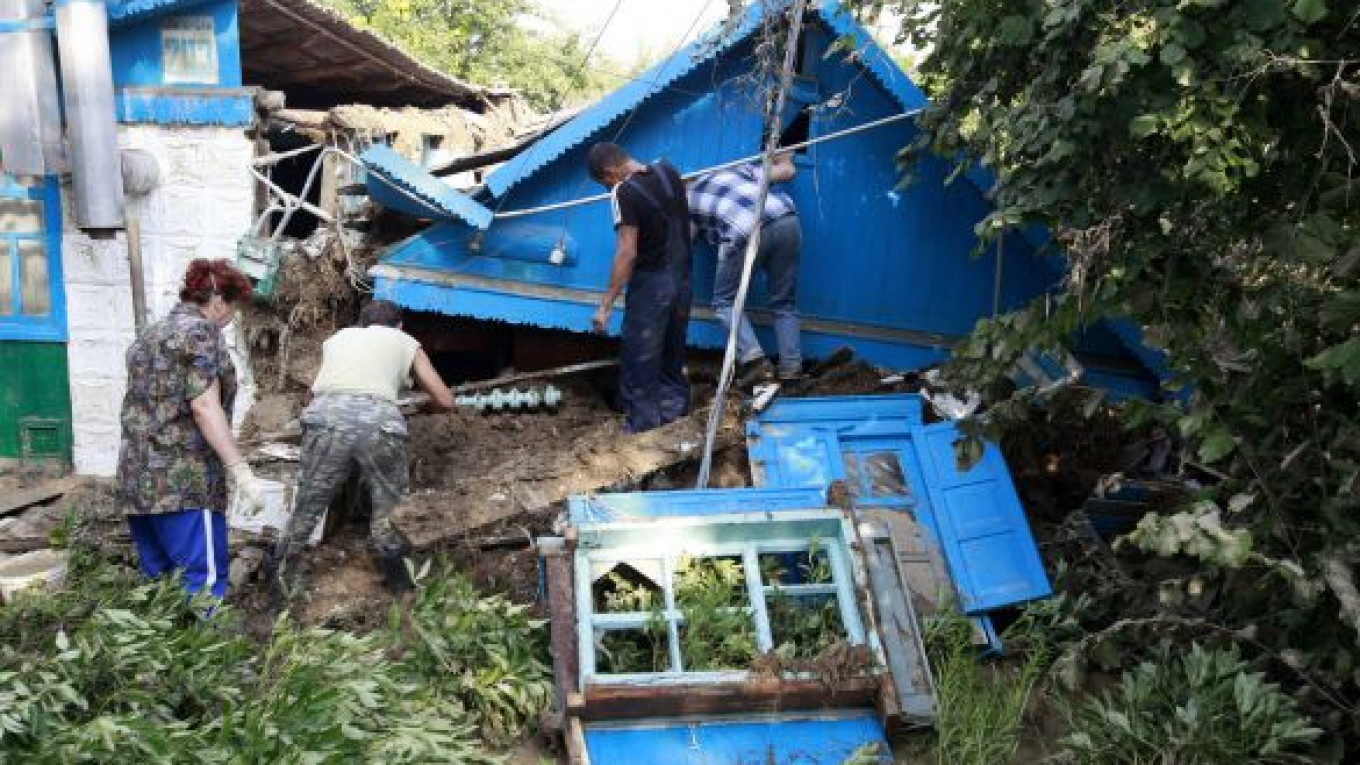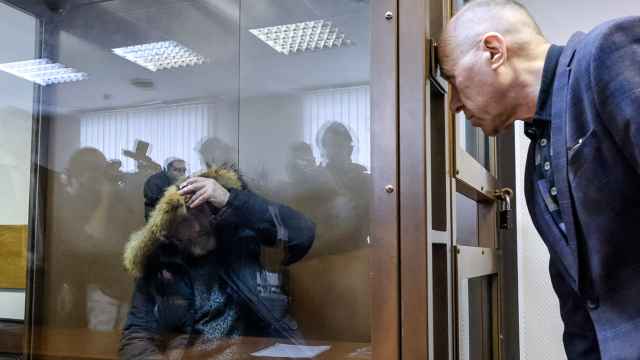Flash floods swamped the southern Krasnodar region over the weekend after two months' average rain fell in a few hours, killing at least 153 people and wreaking costly damage to infrastructure.
The local town of Krymsk, population 60,000, suffered the highest death toll — 139 people — and the most damage, officials said. Krymsk is 340 kilometers northwest of Sochi, the location of the 2014 Winter Olympics.
Eyewitnesses spoke about homes destroyed, cars swept away by torrents of water and businesses ruined after heavy rainfall Friday night. Locals complained that government intervention came much too late.
“Nobody told us anything. We had to evacuate our children on our own,” Krymsk resident Olga Gondar said by phone.
“Emergency Situations Ministry staff came only after everything had happened,” said her husband, Alexander Gondar. He said his mother-in-law’s house, where two of the couple’s children were staying, was struck by the rising water.
President Vladimir Putin arrived in the region Saturday to survey the devastation. He declared Monday a national day of mourning. This is the first national disaster since his return to the Kremlin for a third term as president.
Putin also ordered regional authorities to monitor the Neberdzhayevskoye reservoir after bloggers and opposition politicians took to social media to blame the flooding on a “tsunami” caused by authorities releasing water too quickly from the reservoir.
“Cars were being carried down the street by a giant wave! My friend saw this. He saved himself by climbing onto the second floor of his house. This is not rain,” Twitter user @Estraniero said.
Yabloko leader Sergei Mitrokhin was similarly skeptical about authorities’ version of events.
“The declared number of victims of the flooding is likely understated,” Mitrokhin wrote on Twitter. “Local inhabitants confirmed the fact that at 2 a.m. the reservoir’s sluice gates were opened.”
On Sunday, investigators denied that the reservoir could have caused the flooding, saying no large water surges had been detected and that they would not be looking into that scenario.
The nation’s top investigator, Alexander Bastrykin, later arrived on the scene and opened a criminal case on charges of negligence leading to multiple deaths.
“The water level almost reached the ceiling. Absolutely nothing is left,” a cafe owner in Krymsk told Channel One.
Businessman Oleg Marygin said on NTV that half his goods had floated away and that he was standing guard day and night outside his premises to ward off thieves plundering the wreckage.
Seven local residents were caught looting Sunday, police said.
The Emergency Situations Ministry said that it had dispatched rescue teams from Moscow to provide aid and that more than 12,000 people had been affected in total.
Emergency workers converted a youth center into a shelter where displaced residents could receive food, warm clothing and information about missing relatives.
The floods came at a time when children from across Russia were spending their summer vacations in the region. Only four children’s camps suffered, and children were to be evacuated, Health Minister Veronika Skvortsova told RIA-Novosti.
The region, on the coast of the Black Sea, is a popular summer getaway for tourists, who often rent housing from locals.
Yury Dzagania, a leader of the Communist Party branch in Sochi, said authorities should consider taking preventative measures in the area surrounding Sochi, which could also be affected by the flood.
“We are far away from Krymsk, but here a lot of new infrastructure is often flooded after rain,” Dzagania said. He blamed disrepair of the area’s water management systems for contributing to the tragedy.
According to the Investigative Committee, 153 people had died in the flooding by Sunday night. About 100 people were being hospitalized, Interfax reported.
“In the majority of cases, people died in their homes,” investigators said in a statement. Krasnodar officials said burials would begin Monday.
Officials also promised families who had lost loved ones 2 million rubles ($61,000) from federal and regional coffers and up to 100,000 rubles to those who had suffered material losses, media reports said.
The tragedy has mobilized volunteer groups who posted information on Facebook and Twitter about how to donate money to the victims.
“No one can remember such floods in our history. There was nothing of the kind in the past 70 years,” Krasnodar Governor Alexander Tkachyov told Itar-Tass.
The disaster presents a challenge for Tkachyov, a member of the United Russia party and one of the longest serving governors. The opposition A Just Russia party said Sunday that it would seek to oust him next week over the disaster.
At a meeting late Saturday in Krymsk, Putin questioned regional officials on their response to the disaster and demanded action after flying over the disaster-struck area in a helicopter.
“The head of the Investigative Committee will check the actions of all authorities — how the warning was given, when it came, how it should have been given and how everyone acted,” Putin said, according to a transcript posted on the Kremlin website.
As well as human casualties, the flooding also caused major damage to infrastructure in the relatively affluent Krasnodar region.
Roads, telecommunications, energy supplies, drinking water and drainage systems were all disrupted. In addition, Transneft temporarily halted loading crude onto tankers in Novorossiisk on Saturday due to the severe water flows.
Channel One said the damage could stretch to more than 1 billion rubles ($30 million).
But residents from a nearby town, Gelendzhik, where nine people were reported dead, said that by Sunday afternoon the situation was returning to normal.
“The weather is hot, and people are even swimming,” a hotel administrator who introduced herself as Tatyana Nikolayevna said by phone. A local resident for 40 years, she said she has never seen flooding like this.
“But people will still continue to come. Don’t you know Russian people?” she said.
A Message from The Moscow Times:
Dear readers,
We are facing unprecedented challenges. Russia's Prosecutor General's Office has designated The Moscow Times as an "undesirable" organization, criminalizing our work and putting our staff at risk of prosecution. This follows our earlier unjust labeling as a "foreign agent."
These actions are direct attempts to silence independent journalism in Russia. The authorities claim our work "discredits the decisions of the Russian leadership." We see things differently: we strive to provide accurate, unbiased reporting on Russia.
We, the journalists of The Moscow Times, refuse to be silenced. But to continue our work, we need your help.
Your support, no matter how small, makes a world of difference. If you can, please support us monthly starting from just $2. It's quick to set up, and every contribution makes a significant impact.
By supporting The Moscow Times, you're defending open, independent journalism in the face of repression. Thank you for standing with us.
Remind me later.






